- Home
- Jack London
The House of Pride Page 2
The House of Pride Read online
Page 2
“But not with my father,” Percival Ford interrupted.
“There you are.” Kennedy shrugged his shoulders. “Cosmic sap and smoke of life. Old Isaac Ford was straitlaced and all the rest, and I know there’s no explaining it, least of all to himself. He understood it no more than you do. Smoke of life, that’s all. And don’t forget one thing, Ford. There was a dab of unruly blood in old Isaac Ford, and Joe Garland inherited it-all of it, smoke of life and cosmic sap; while you inherited all of old Isaac’s ascetic blood. And just because your blood is cold, well-ordered, and well-disciplined, is no reason that you should frown upon Joe Garland. When Joe Garland undoes the work you do, remember that it is only old Isaac Ford on both sides, undoing with one hand what he does with the other. You are Isaac Ford’s right hand, let us say; Joe Garland is his left hand.”
Percival Ford made no answer, and in the silence Dr. Kennedy finished his forgotten Scotch and soda. From across the grounds an automobile hooted imperatively.
“There’s the machine,” Dr. Kennedy said, rising. “I’ve got to run. I’m sorry I’ve shaken you up, and at the same time I’m glad. And know one thing, Isaac Ford’s dab of unruly blood was remarkably small, and Joe Garland got it all. And one other thing. If your father’s left hand offend you, don’t smite it off. Besides, Joe is all right. Frankly, if I could choose between you and him to live with me on a desert isle, I’d choose Joe.”
Little bare-legged children ran about him, playing, on the grass; but Percival Ford did not see them. He was gazing steadily at the singer under the hau tree. He even changed his position once, to get closer. The clerk of the Seaside went by, limping with age and dragging his reluctant feet. He had lived forty years on the Islands. Percival Ford beckoned to him, and the clerk came respectfully, and wondering that he should be noticed by Percival Ford.
“John,” Ford said, “I want you to give me some information. Won’t you sit down?”
The clerk sat down awkwardly, stunned by the unexpected honour. He blinked at the other and mumbled, “Yes, sir, thank you.”
“John, who is Joe Garland?”
The clerk stared at him, blinked, cleared his throat, and said nothing.
“Go on,” Percival Ford commanded.
“Who is he?”
“You’re joking me, sir,” the other managed to articulate.
“I spoke to you seriously.”
The clerk recoiled from him.
“You don’t mean to say you don’t know?” he questioned, his question in itself the answer.
“I want to know.”
“Why, he’s-” John broke off and looked about him helplessly. “Hadn’t you better ask somebody else? Everybody thought you knew. We always thought… ”
“Yes, go ahead.”
“We always thought that that was why you had it in for him.”
Photographs and miniatures of Isaac Ford were trooping through his son’s brain, and ghosts of Isaac Ford seemed in the air about hint “I wish you good night, sir,” he could hear the clerk saying, and he saw him beginning to limp away.
“John,” he called abruptly.
John came back and stood near him, blinking and nervously moistening his lips.
“You haven’t told me yet, you know.”
“Oh, about Joe Garland?”
“Yes, about Joe Garland. Who is he?”
“He’s your brother, sir, if I say it who shouldn’t.”
“Thank you, John. Good night.”
“And you didn’t know?” the old man queried, content to linger, now that the crucial point was past.
“Thank you, John. Good night,” was the response.
“Yes, sir, thank you, sir. I think it’s going to rain. Good night, sir.”
Out of the clear sky, filled only with stars and moonlight, fell a rain so fine and attenuated as to resemble a vapour spray. Nobody minded it; the children played on, running bare-legged over the grass and leaping into the sand; and in a few minutes it was gone. In the south-east, Diamond Head, a black blot, sharply defined, silhouetted its crater-form against the stars. At sleepy intervals the surf flung its foam across the sands to the grass, and far out could be seen the black specks of swimmers under the moon. The voices of the singers, singing a waltz, died away; and in the silence, from somewhere under the trees, arose the laugh of a woman that was a love-cry. It startled Percival Ford, and it reminded him of Dr. Kennedy’s phrase. Down by the outrigger canoes, where they lay hauled out on the sand, he saw men and women, Kanakas, reclining languorously, like lotus-eaters, the women in white holokus; and against one such holoku he saw the dark head of the steersman of the canoe resting upon the woman’s shoulder. Farther down, where the strip of sand widened at the entrance to the lagoon, he saw a man and woman walking side by side. As they drew near the light lanai, he saw the woman’s hand go down to her waist and disengage a girdling arm. And as they passed him, Percival Ford nodded to a captain he knew, and to a major’s daughter. Smoke of life, that was it, an ample phrase. And again, from under the dark algaroba tree arose the laugh of a woman that was a love-cry; and past his chair, on the way to bed, a bare-legged youngster was led by a chiding Japanese nurse-maid. The voices of the singers broke softly and meltingly into an Hawaiian love-song, and officers and women, with encircling arms, were gliding and whirling on the lanai; and once again the woman laughed under the algaroba trees.
And Percival Ford knew only disapproval of it all. He was irritated by the love-laugh of the woman, by the steersman with pillowed head on the white holoku, by the couples that walked on the beach, by the officers and women that danced, and by the voices of the singers singing of love, and his brother singing there with them under the hau tree. The woman that laughed especially irritated him. A curious train of thought was aroused. He was Isaac Ford’s son, and what had happened with Isaac Ford might happen with him. He felt in his cheeks the faint heat of a blush at the thought, and experienced a poignant sense of shame. He was appalled by what was in his blood. It was like learning suddenly that his father had been a leper and that his own blood might bear the taint of that dread disease. Isaac Ford, the austere soldier of the Lord-the old hypocrite! What difference between him and any beach-comber? The house of pride that Percival Ford had builded was tumbling about his ears.
The hours passed, the army people laughed and danced, the native orchestra played on, and Percival Ford wrestled with the abrupt and overwhelming problem that had been thrust upon him. He prayed quietly, his elbow on the table, his head bowed upon his hand, with all the appearance of any tired onlooker. Between the dances the army men and women and the civilians fluttered up to him and buzzed conventionally, and when they went back to the lanai he took up his wrestling where he had left it off.
He began to patch together his shattered ideal of Isaac Ford, and for cement he used a cunning and subtle logic. It was of the sort that is compounded in the brain laboratories of egotists, and it worked. It was incontrovertible that his father had been made of finer clay than those about him; but still, old Isaac had been only in the process of becoming, while he, Percival Ford, had become. As proof of it, he rehabilitated his father and at the same time exalted himself. His lean little ego waxed to colossal proportions. He was great enough to forgive. He glowed at the thought of it. Isaac Ford had been great, but he was greater, for he could forgive Isaac Ford and even restore him to the holy place in his memory, though the place was not quite so holy as it had been. Also, he applauded Isaac Ford for having ignored the outcome of his one step aside. Very well, he, too, would ignore it.
The dance was breaking up. The orchestra had finished “Aloha Oe” and was preparing to go home. Percival Ford clapped his hands for the Japanese servant.
“You tell that man I want to see him,” he said, pointing out Joe Garland. “Tell him to come here, now.”
Joe Garland approached and halted respectfully several paces away, nervously fingering the guitar which he still carried. The other did not ask him to sit dow
n.
“You are my brother,” he said.
“Why, everybody knows that,” was the reply, in tones of wonderment.
“Yes, so I understand,” Percival Ford said dryly. “But I did not know it till this evening.”
The half-brother waited uncomfortably in the silence that followed, during which Percival Ford coolly considered his next utterance.
“You remember that first time I came to school and the boys ducked me?” he asked. “Why did you take my part?”
The half-brother smiled bashfully.
“Because you knew?”
“Yes, that was why.”
“But I didn’t know,” Percival Ford said in the same dry fashion.
“Yes,” the other said.
Another silence fell. Servants were beginning to put out the lights on the lanai.
“You know… now,” the half-brother said simply.
Percival Ford frowned. Then he looked the other over with a considering eye.
“How much will you take to leave the Islands and never come back?” he demanded.
“And never come back?” Joe Garland faltered. “It is the only land I know. Other lands are cold. I do not know other lands. I have many friends here. In other lands there would not be one voice to say, ‘Aloha, Joe, my boy.’”
“I said never to come back,” Percival Ford reiterated. “The Alameda sails tomorrow for San Francisco.”
Joe Garland was bewildered.
“But why?” he asked. “You know now that we are brothers.”
“That is why,” was the retort. “As you said yourself, everybody knows. I will make it worth your while.”
All awkwardness and embarrassment disappeared from Joe Garland. Birth and station were bridged and reversed.
“You want me to go?” he demanded.
“I want you to go and never come back,” Percival Ford answered.
And in that moment, flashing and fleeting, it was given him to see his brother tower above him like a mountain, and to feel himself dwindle and dwarf to microscopic insignificance. But it is not well for one to see himself truly, nor can one so see himself for long and live; and only for that flashing moment did Percival Ford see himself and his brother in true perspective. The next moment he was mastered by his meagre and insatiable ego.
“As I said, I will make it worth your while. You will not suffer. I will pay you well.”
“All right,” Joe Garland said. “I’ll go.”
He started to turn away.
“Joe,” the other called. “You see my lawyer tomorrow morning. Five hundred down and two hundred a month as long as you stay away.”
“You are very kind,” Joe Garland answered softly. “You are too kind. And anyway, I guess I don’t want your money. I go tomorrow on the Alameda.”
He walked away, but did not say good-bye.
Percival Ford clapped his hands.
“Boy,” he said to the Japanese, “a lemonade.”
And over the lemonade he smiled long and contentedly to himself.
KOOLAU THE LEPER
“Because we are sick they take away our liberty. We have obeyed the law. We have done no wrong. And yet they would put us in prison. Molokai is a prison. That you know. Niuli, there, his sister was sent to Molokai seven years ago. He has not seen her since. Nor will he ever see her. She must stay there until she dies. This is not her will. It is not Niuli’s will. It is the will of the white men who rule the land. And who are these white men?
“We know. We have it from our fathers and our fathers’ fathers. They came like lambs, speaking softly. Well might they speak softly, for we were many and strong, and all the islands were ours. As I say, they spoke softly. They were of two kinds. The one kind asked our permission, our gracious permission, to preach to us the word of God. The other kind asked our permission, our gracious permission, to trade with us. That was the beginning. Today all the islands are theirs, all the land, all the cattle-everything is theirs. They that preached the word of God and they that preached the word of Rum have fore-gathered and become great chiefs. They live like kings in houses of many rooms, with multitudes of servants to care for them. They who had nothing have everything, and if you, or I, or any Kanaka be hungry, they sneer and say, ‘Well, why don’t you work? There are the plantations.’”
Koolau paused. He raised one hand, and with gnarled and twisted fingers lifted up the blazing wreath of hibiscus that crowned his black hair. The moonlight bathed the scene in silver. It was a night of peace, though those who sat about him and listened had all the seeming of battle-wrecks. Their faces were leonine. Here a space yawned in a face where should have been a nose, and there an arm-stump showed where a hand had rotted off. They were men and women beyond the pale, the thirty of them, for upon them had been placed the mark of the beast.
They sat, flower-garlanded, in the perfumed, luminous night, and their lips made uncouth noises and their throats rasped approval of Koolau’s speech. They were creatures who once had been men and women. But they were men and women no longer. They were monsters-in face and form grotesque caricatures of everything human. They were hideously maimed and distorted, and had the seeming of creatures that had been racked in millenniums of hell. Their hands, when they possessed them, were like harpy claws. Their faces were the misfits and slips, crushed and bruised by some mad god at play in the machinery of life. Here and there were features which the mad god had smeared half away, and one woman wept scalding tears from twin pits of horror, where her eyes once had been. Some were in pain and groaned from their chests. Others coughed, making sounds like the tearing of tissue. Two were idiots, more like huge apes marred in the making, until even an ape were an angel. They mowed and gibbered in the moonlight, under crowns of drooping, golden blossoms. One, whose bloated ear-lobe flapped like a fan upon his shoulder, caught up a gorgeous flower of orange and scarlet and with it decorated the monstrous ear that flip-flapped with his every movement.
And over these things Koolau was king. And this was his kingdom,-a flower-throttled gorge, with beetling cliffs and crags, from which floated the blattings of wild goats. On three sides the grim walls rose, festooned in fantastic draperies of tropic vegetation and pierced by cave-entrances-the rocky lairs of Koolau’s subjects. On the fourth side the earth fell away into a tremendous abyss, and, far below, could be seen the summits of lesser peaks and crags, at whose bases foamed and rumbled the Pacific surge. In fine weather a boat could land on the rocky beach that marked the entrance of Kalalau Valley, but the weather must be very fine. And a cool-headed mountaineer might climb from the beach to the head of Kalalau Valley, to this pocket among the peaks where Koolau ruled; but such a mountaineer must be very cool of head, and he must know the wild-goat trails as well. The marvel was that the mass of human wreckage that constituted Koolau’s people should have been able to drag its helpless misery over the giddy goat-trails to this inaccessible spot.
“Brothers,” Koolau began.
But one of the mowing, apelike travesties emitted a wild shriek of madness, and Koolau waited while the shrill cachination was tossed back and forth among the rocky walls and echoed distantly through the pulseless night.
“Brothers, is it not strange? Ours was the land, and behold, the land is not ours. What did these preachers of the word of God and the word of Rum give us for the land? Have you received one dollar, as much as one dollar, any one of you, for the land? Yet it is theirs, and in return they tell us we can go to work on the land, their land, and that what we produce by our toil shall be theirs. Yet in the old days we did not have to work. Also, when we are sick, they take away our freedom.”
“Who brought the sickness, Koolau?” demanded Kiloliana, a lean and wiry man with a face so like a laughing faun’s that one might expect to see the cloven hoofs under him. They were cloven, it was true, but the cleavages were great ulcers and livid putrefactions. Yet this was Kiloliana, the most daring climber of them all, the man who knew every goat-trail and who had led Koolau and h
is wretched followers into the recesses of Kalalau.
“Ay, well questioned,” Koolau answered. “Because we would not work the miles of sugar-cane where once our horses pastured, they brought the Chinese slaves from overseas. And with them came the Chinese sickness-that which we suffer from and because of which they would imprison us on Molokai. We were born on Kauai. We have been to the other islands, some here and some there, to Oahu, to Maui, to Hawaii, to Honolulu. Yet always did we come back to Kauai. Why did we come back? There must be a reason. Because we love Kauai. We were born here. Here we have lived. And here shall we die-unless-unless-there be weak hearts amongst us. Such we do not want. They are fit for Molokai. And if there be such, let them not remain. Tomorrow the soldiers land on the shore. Let the weak hearts go down to them. They will be sent swiftly to Molokai. As for us, we shall stay and fight. But know that we will not die. We have rifles. You know the narrow trails where men must creep, one by one. I, alone, Koolau, who was once a cowboy on Niihau, can hold the trail against a thousand men. Here is Kapalei, who was once a judge over men and a man with honour, but who is now a hunted rat, like you and me. Hear him. He is wise.”
Kapalei arose. Once he had been a judge. He had gone to college at Punahou. He had sat at meat with lords and chiefs and the high representatives of alien powers who protected the interests of traders and missionaries. Such had been Kapalei. But now, as Koolau had said, he was a hunted rat, a creature outside the law, sunk so deep in the mire of human horror that he was above the law as well as beneath it. His face was featureless, save for gaping orifices and for the lidless eyes that burned under hairless brows.
“Let us not make trouble,” he began. “We ask to be left alone. But if they do not leave us alone, then is the trouble theirs and the penalty. My fingers are gone, as you see.” He held up his stumps of hands that all might see. “Yet have I the joint of one thumb left, and it can pull a trigger as firmly as did its lost neighbour in the old days. We love Kauai. Let us live here, or die here, but do not let us go to the prison of Molokai. The sickness is not ours. We have not sinned. The men who preached the word of God and the word of Rum brought the sickness with the coolie slaves who work the stolen land. I have been a judge. I know the law and the justice, and I say to you it is unjust to steal a man’s land, to make that man sick with the Chinese sickness, and then to put that man in prison for life.”

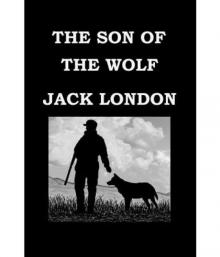 The Son of the Wolf
The Son of the Wolf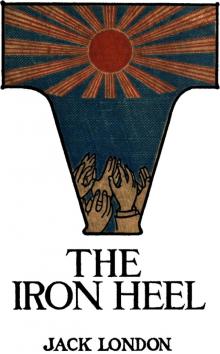 The Iron Heel
The Iron Heel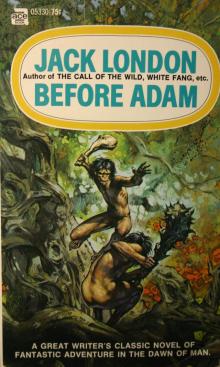 Before Adam
Before Adam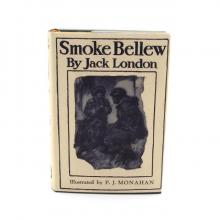 Smoke Bellew
Smoke Bellew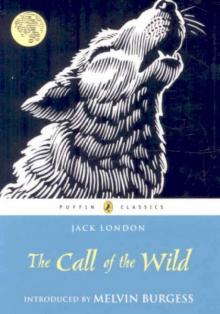 The Call of the Wild
The Call of the Wild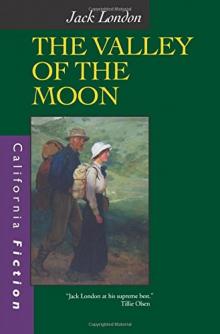 The Valley of the Moon Jack London
The Valley of the Moon Jack London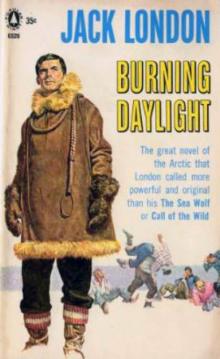 Burning Daylight
Burning Daylight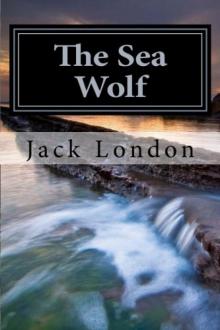 The Sea Wolf
The Sea Wolf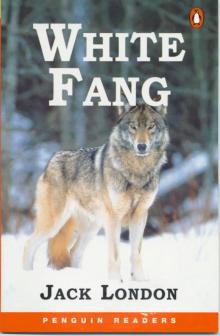 White Fang
White Fang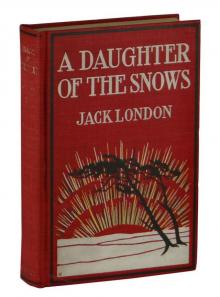 A Daughter of the Snows
A Daughter of the Snows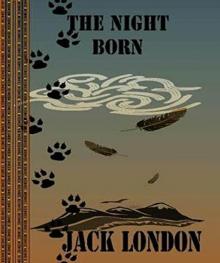 The Night-Born
The Night-Born A Son Of The Sun
A Son Of The Sun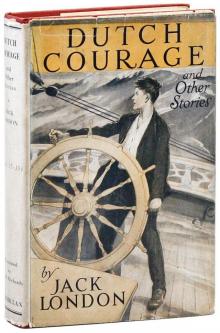 Dutch Courage and Other Stories
Dutch Courage and Other Stories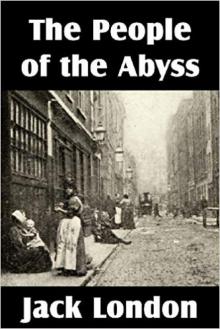 The People of the Abyss
The People of the Abyss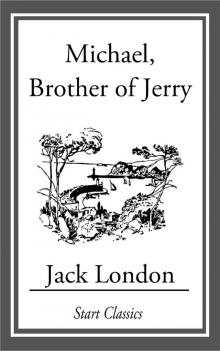 Michael, Brother of Jerry
Michael, Brother of Jerry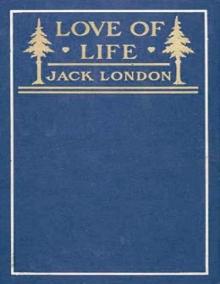 Love of Life, and Other Stories
Love of Life, and Other Stories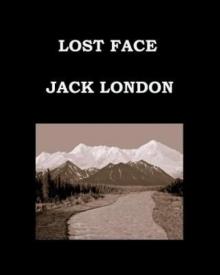 Lost Face
Lost Face The Road
The Road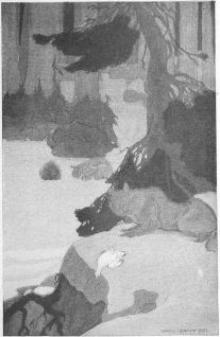 Love of Life
Love of Life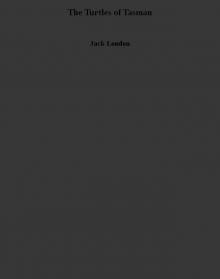 The Turtles of Tasman
The Turtles of Tasman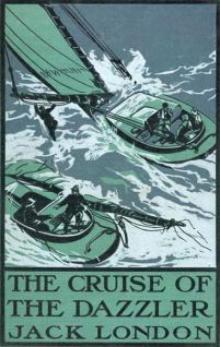 The Cruise of The Dazzler
The Cruise of The Dazzler The Heathen
The Heathen The Scab
The Scab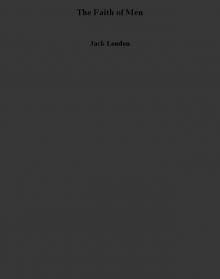 The Faith of Men
The Faith of Men Adventure
Adventure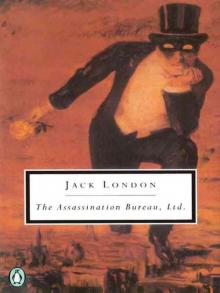 The Assassination Bureau, Ltd.
The Assassination Bureau, Ltd.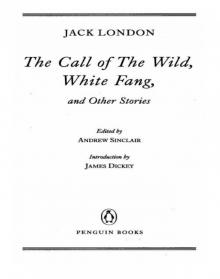 The Call of the Wild, White Fang, and Other Stories
The Call of the Wild, White Fang, and Other Stories The Call of the Wild and Selected Stories
The Call of the Wild and Selected Stories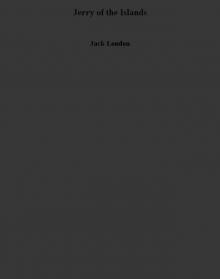 Jerry of the Islands
Jerry of the Islands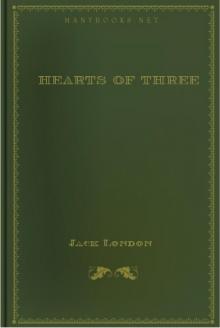 Hearts of Three
Hearts of Three The House of Pride
The House of Pride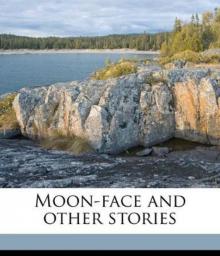 Moon-Face and Other Stories
Moon-Face and Other Stories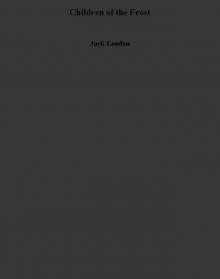 Children of the Frost
Children of the Frost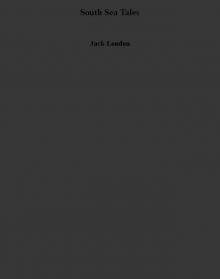 South Sea Tales
South Sea Tales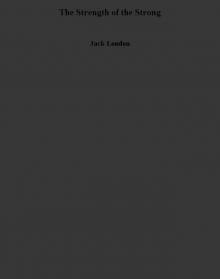 The Strength of the Strong
The Strength of the Strong The Jacket (The Star-Rover)
The Jacket (The Star-Rover)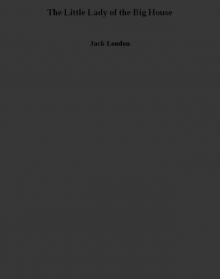 The Little Lady of the Big House
The Little Lady of the Big House John Barleycorn
John Barleycorn ADaugter of Snows
ADaugter of Snows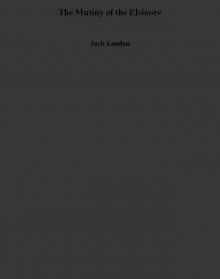 The Mutiny of the Elsinore
The Mutiny of the Elsinore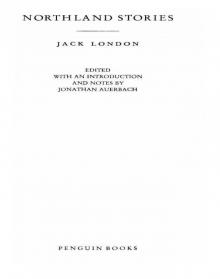 Northland Stories
Northland Stories Tales of the Fish Patrol
Tales of the Fish Patrol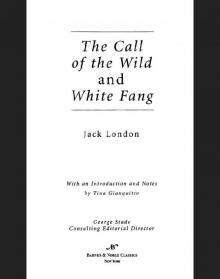 Call of the Wild and White Fang (Barnes & Noble Classics Series)
Call of the Wild and White Fang (Barnes & Noble Classics Series)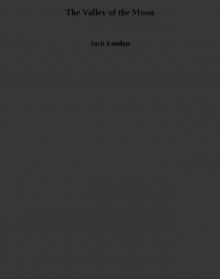 The Valley of the Moon
The Valley of the Moon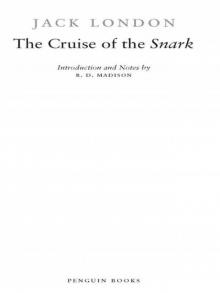 The Cruise of the Snark
The Cruise of the Snark The Game
The Game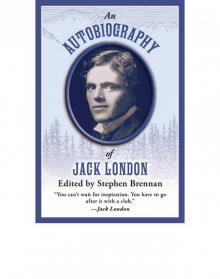 An Autobiography of Jack London
An Autobiography of Jack London